Cleaning a pistol is a simple but essential process. Tyler Freel
If you’re a new shooter, or just bought your first handgun, learning how to clean a pistol is one of the most basic and important things you can do. Properly maintaining your equipment will make you more familiar with it and ensure that it keeps working for you. Every model of pistol is a little different, but the same general cleaning procedure will work for most semi autos.
Tools To Clean A Pistol
You don’t need anything fancy to clean a pistol, but there are many great gun cleaning kits out there that make it easier. If you’re going to be cleaning a wide variety of guns, it’s worth investing in a larger kit and some specialized cleaning rods and supplies. If you’re just cleaning a pistol or two, a small pistol cleaning kit is a great place to start. I like kits that use cleaning rods for high-volume cleaning, but pull-through cable kits from Otis are compact and work great.
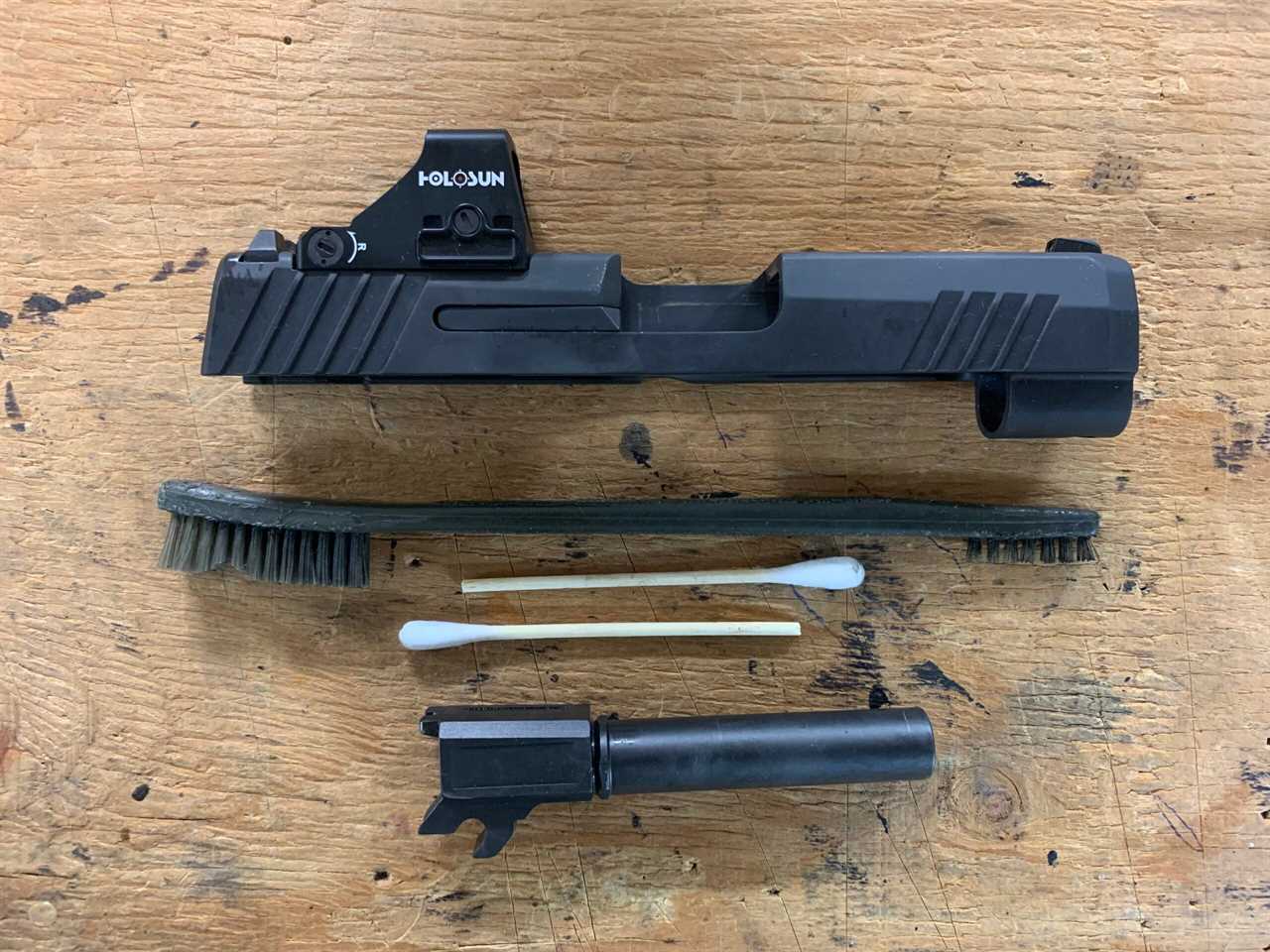
A nylon brush and Q-tips are great for cleaning carbon fouling from pistol parts. Tyler Freel
Most kits will have the majority of what you need, but it helps to have a few extra items that might not be included. Here are some essentials:
- Cleaning rod or pull-through cable
- Cleaning jags and brush for your caliber(s)
- Nylon cleaning brush (toothbrush)
- Cotton gun-cleaning patches for appropriate caliber
- Cotton t-shirt rag(s)
- Gun-cleaning solvent
- Gun oil
- Nitrile Gloves
Steps To Clean A Pistol
When you have a few essential tools, cleaning a pistol is pretty easy. You don’t need to be able to eat off of it, but basic cleaning and lubrication will help your pistol function better and last longer. Before you clean a pistol, ensure that the gun is completely unloaded, and clear your workspace of all ammunition. Next, you’ll disassemble, or “field strip,” your pistol into its major components. Your owners manual will tell you how to do this, and it will tell you where to stop. You don’t need to take the gun completely apart.
Once field-stripped, you can begin cleaning your pistol. You don’t have to do things exactly the way I do, but these are the steps I follow when cleaning my own pistols.
Cleaning the Barrel
First, run a couple of solvent-soaked patches through the barrel, pushing them from the breech (back) to the muzzle (front). It’s the same for the pull-through cleaning systems. You always want to push or pull patches from the back of the barrel and out the front to avoid damage to the rifling at the muzzle.
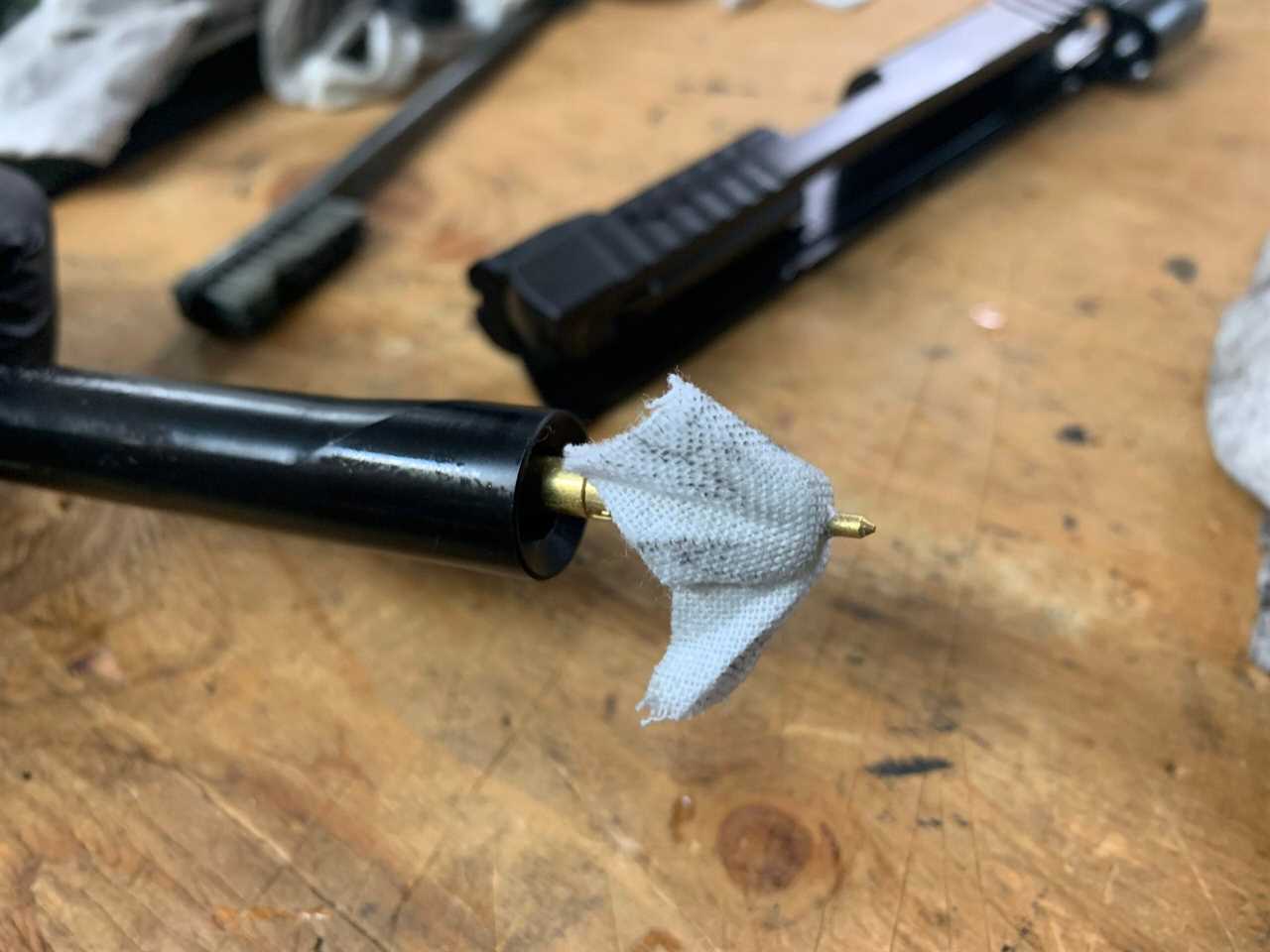
Cotton patches are pushed through the bore to remove fouling. Tyler Freel
After wetting the bore, set the barrel aside. When you’re finished cleaning the rest of the pistol, push another wet patch through the bore. Then, run a wet bore brush of appropriate caliber back and forth through the barrel about 10 times. Wet the outside of the barrel with solvent and brush away any powder fouling that has accumulated around the feed ramp. After that, wipe the outside of the barrel down with your rag and run two or three more wet patches through, then dry patches until all the solvent is gone.
To finish, run one gun-oil-soaked patch through the bore followed by a dry patch—this helps protect the bore from corrosion, but you don’t want excess oil in the bore. Generally, you don’t need to remove copper fouling from the bore, so don’t worry if you still see copper streaks on the rifling. If the barrel is especially dirty, it might take a couple cycles of patches and brushing to remove all the powder fouling.
Cleaning for Hard-Cast Bullets
This generally won’t apply to most shooters, but some popular backcountry bear defense ammunition uses non-jacketed lead bullets. These are safe to shoot, but the lead is soft and fouling will accumulate in your bore. If your bore is really fouled, and you switch back to harder copper-jacketed bullets, it can cause dangerous pressure issues.
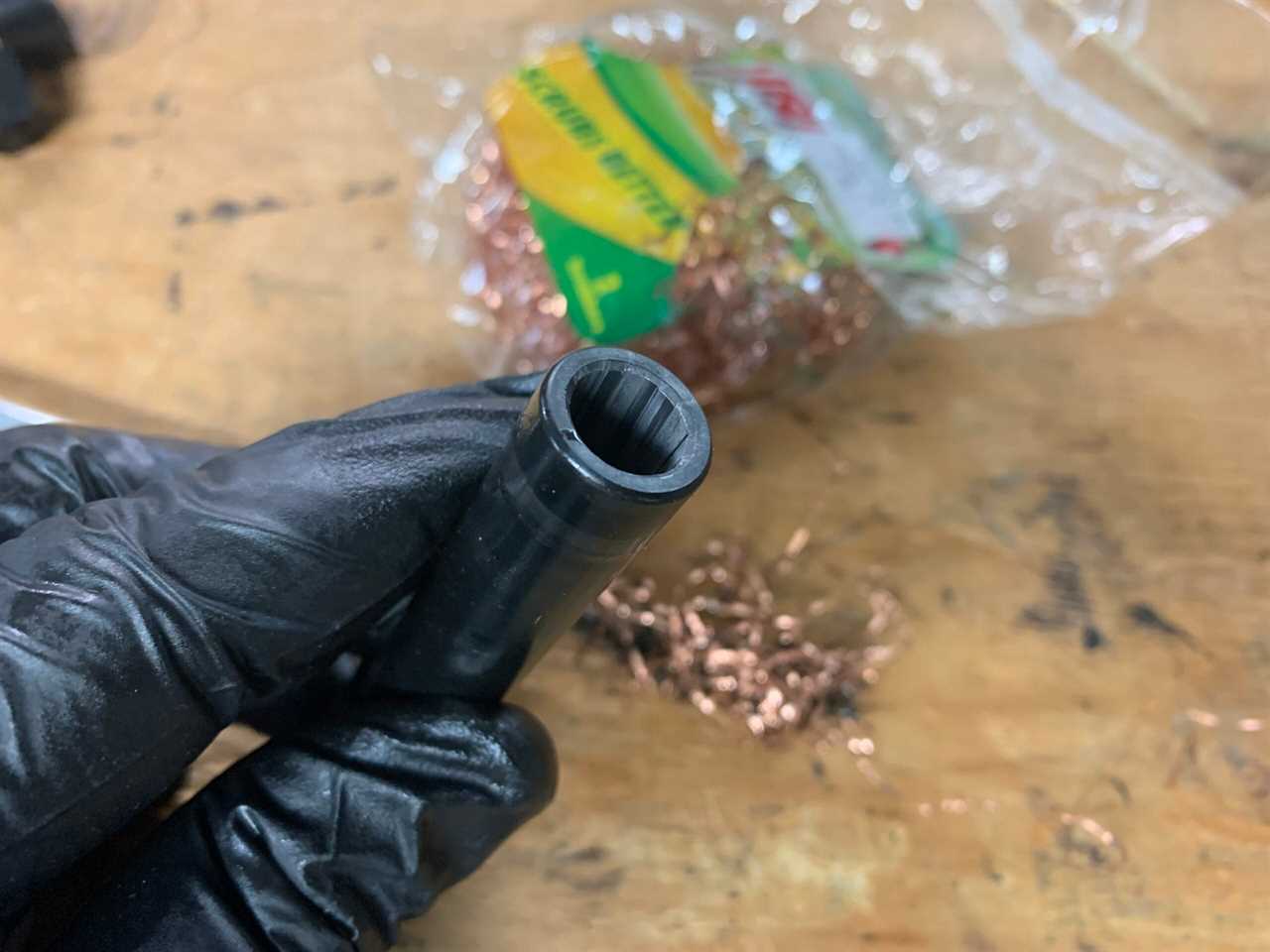
Lead fouling needs to be removed after shooting non-jacketed bullets. Tyler Freel
Most lead fouling can be removed with good solvent and a bore brush, but stubborn fouling can be removed more easily with a bore brush wrapped with strands of 100% copper scrub pads. They need to be copper, because steel pads will scratch your bore.
Cleaning the Slide and Recoil Spring
Powder fouling and brass shavings often accumulate inside a pistol’s slide, and you want to clean any stubborn deposits. Start by wiping down the inside and bottom of the slide with a rag. This will remove old oil, some powder fouling, and other accumulated debris. Spray or apply solvent with a rag or Q-tip to dirty areas inside the slide and use your nylon brush if necessary. Wipe everything clean. If your pistol has a red dot optic, try not to get solvent on it. Use alcohol lens wipes to clean your optic.
Usually, you won’t have to clean the recoil spring or guide rod assembly beyond just wiping them down. If they’re especially dirty, try an aerosol degreasing gun solvent, but make sure to lubricate when you’re done.
When cleaning the slide, avoid getting excess solvent into the striker or firing pin assemblies unless you are comfortable taking them apart for a deep clean. For general cleaning purposes, they don’t need to be disassembled.
Cleaning a Pistol Frame
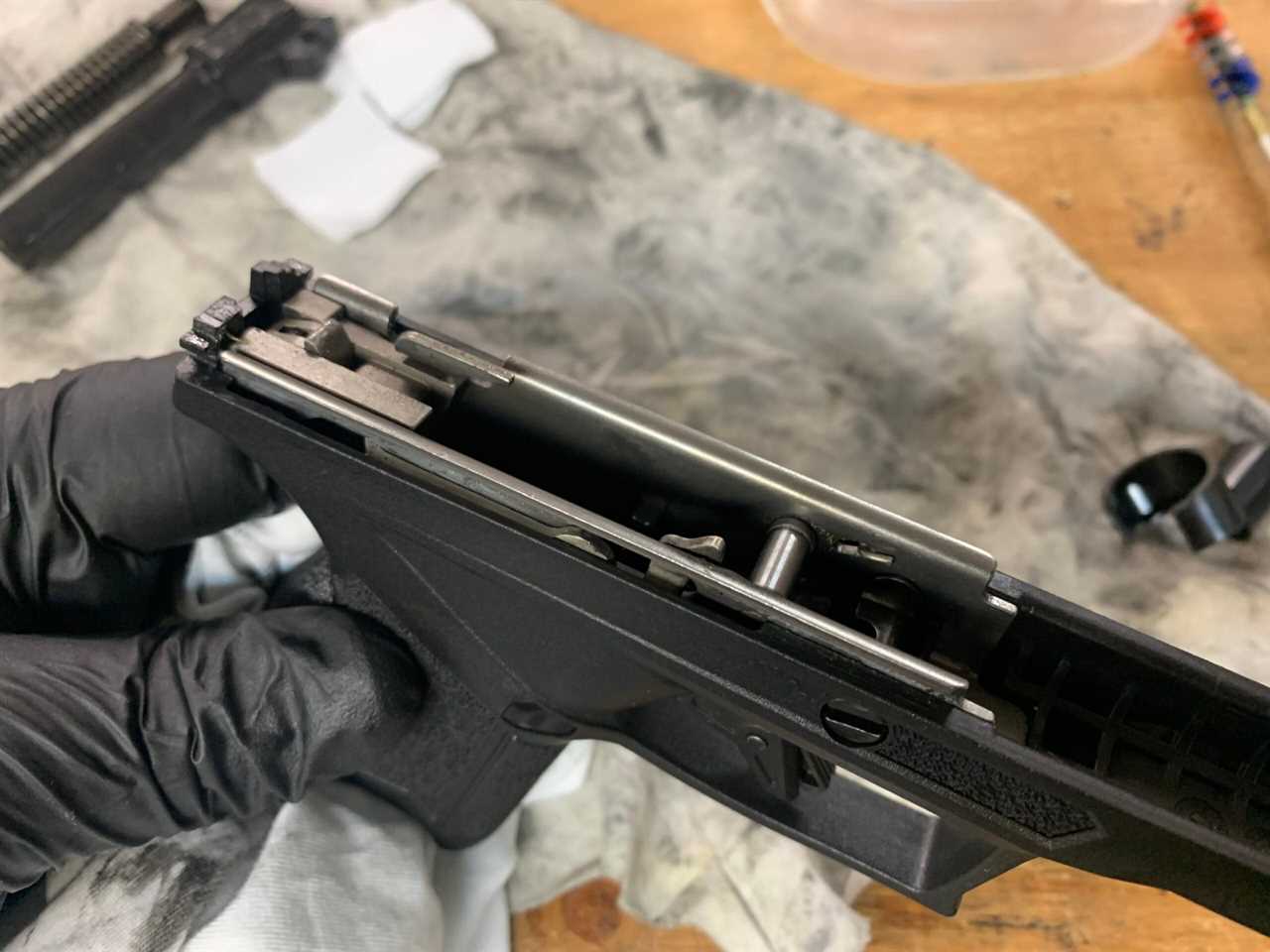
Wipe the frame of the pistol clean, but don’t get excess solvent into the small parts and mechanisms. Tyler Freel
The frame of your pistol usually houses the trigger or fire control group, and some small parts. Most manufacturers advise against taking them apart—and usually it’s not necessary. Carbon fouling will accumulate around the top of the magazine well and around the forward slide rails—basically everywhere around the breech of the barrel.
Using a rag, wipe off loose, excessive fouling or brass shavings, and excess lubrication from the slide rails. Use a solvent-dipped brush or Q-tip to remove stubborn powder deposits, but be careful not to let excess solvent run into the mechanisms. Using spray solvents isn’t the best idea for the frame because it will accumulate in the mechanisms and small parts. Wipe everything dry.
Lubricate and Assemble
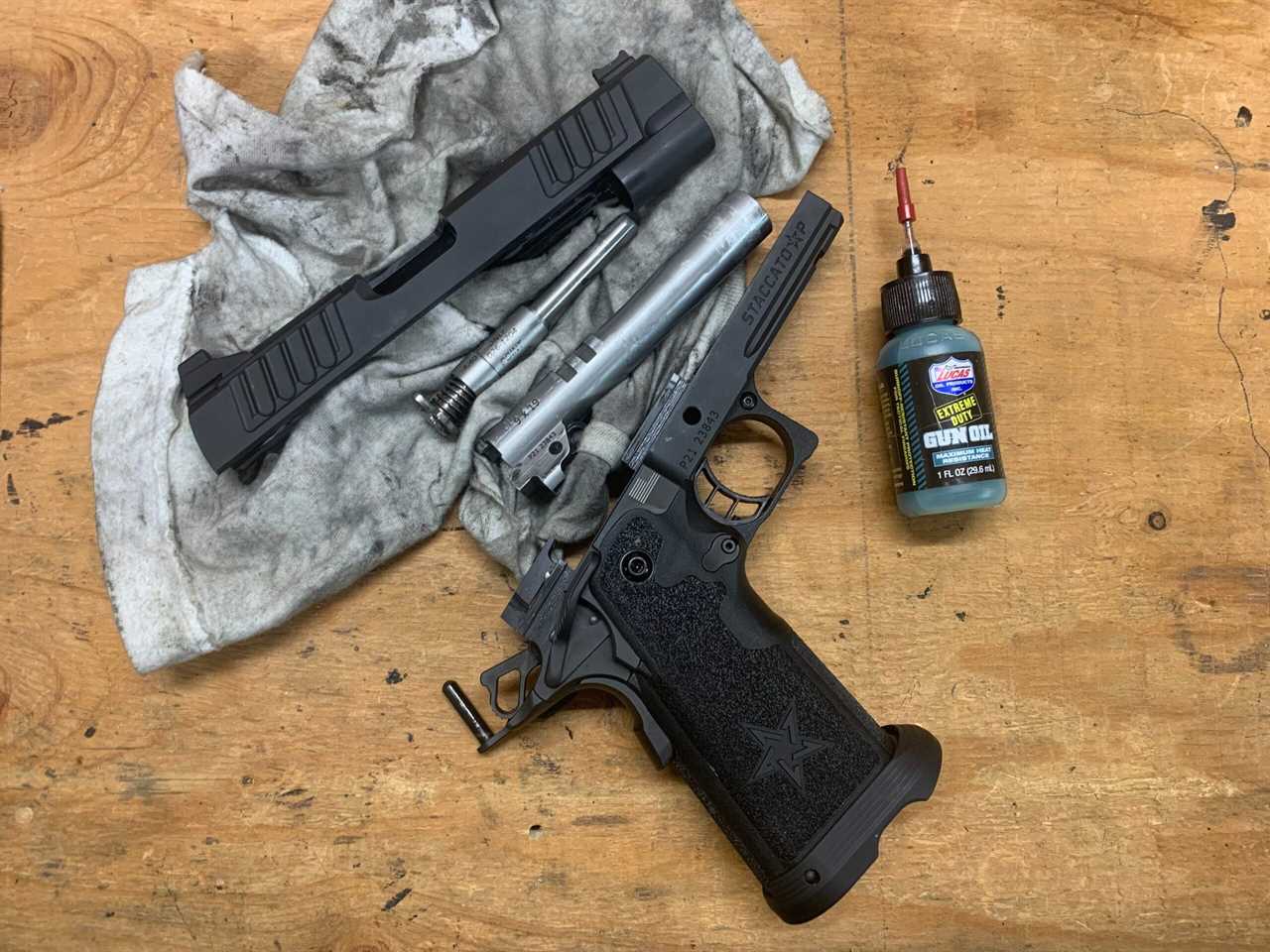
A pistol should be properly, but not excessively, lubricated. Tyler Freel
Once your pistol is clean, lubricate it as suggested by the manufacturer. All parts should be adequately lubricated, but excessive oil will attract dust and fouling. As a general rule, put a couple drops of oil on each slide rail on the frame, and in the slide rail channels inside the slide. Wipe a couple more drops on the inside of the frame where wear marks show contact with the barrel. Two or three drops of oil on the barrel wiped evenly around will do the trick too.
There are many gun oils that will work, but I like more viscous oils like Lucas Extreme Duty Gun Oil. On striker-fired pistols like Glocks and Sigs, I like to use Otis MC-10 grease on the slide rails and channels because it generally stays put and lubricates well.
FAQ’s
Q: What can you clean a pistol with?
It’s possible to clean a pistol with minimal tools. You can clean a pistol with just a rag, a piece of cleaning rod, and some gun oil, but real cleaning tools are helpful and effective.
Q: How often do you really need to clean a pistol?
It depends on your pistol, the ammunition you’re using, and how much you shoot. It’s never a bad idea to clean your pistol after each trip to the range.
Q: What is the best method for cleaning guns?
There are many effective ways to clean guns, but generally, you should disassemble them into major components, use solvent and appropriate-sized patches to clean the bore, scrub or wipe powder fouling from gun components, and lubricate before reassembly.
The post How to Clean a Pistol appeared first on Outdoor Life.
Articles may contain affiliate links which enable us to share in the revenue of any purchases made.
By: Tyler Freel
Title: How to Clean a Pistol
Sourced From: www.outdoorlife.com/guns/how-to-clean-a-pistol/
Published Date: Thu, 30 Mar 2023 15:00:00 +0000
----------------------------------------------
 Backyard GrillingWeekend WarriorsAdvice from DadBeard GroomingTV Shows for Guys4x4 Off-Road CarsMens FashionSports NewsAncient Archeology World NewsPrivacy PolicyTerms And Conditions
Backyard GrillingWeekend WarriorsAdvice from DadBeard GroomingTV Shows for Guys4x4 Off-Road CarsMens FashionSports NewsAncient Archeology World NewsPrivacy PolicyTerms And Conditions
